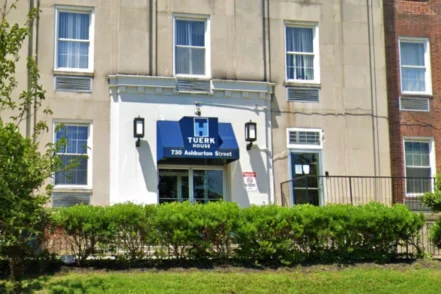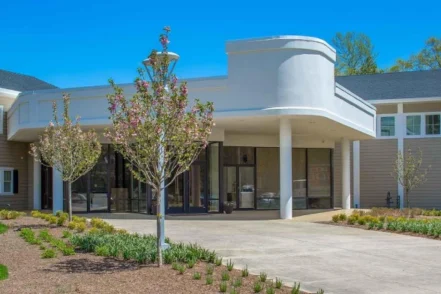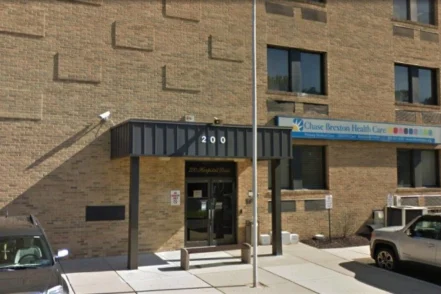About Peninsula Regional Medical Center
The process of healing from an alcohol or drug addiction begins with detox but the symptoms can be too much to bear. At Peninsula Regional Medical Center in Salisbury, Maryland patients are given medical care throughout the detox process and can be referred to the full hospital in case of any complications. They also prescribe comfort medications to reduce the symptoms of withdrawal to make this vital first step as smooth as possible.
A Clear Path
This facility transitions patients from detox to inpatient treatment. There is no need to wait for stabilization to begin rehab. The programs teach patients how to manage stress, learn about their emotions and develop daily routines that can help someone recovering from addiction.
The care is organized into different age groups so patients can get treatment that is relevant to them in terms of life stage and experiences. This makes the recovery process more interesting and less lonely.
Breaking Barriers
Recovery is not only about the medical care but also about the psychic needs such as fear, shame and financial issues. Some people do not go for treatment since they think that their condition cannot be cured but this center offers a nice place where people can try to change their lives.
The therapists here also assist patients in coping with their emotions and turn them to believe they can have a new chance in life. This facility has a full medical staff, mental health professionals and a clear transition from detox to rehab.
Addiction Treatment Programs
Dual Diagnosis
For many people in Maryland, dual diagnosis treatment that addresses mental health and substance use is essential to their recovery. Part of treatment will include managing your mental health symptoms so you aren’t tempted to use substances to self-medicate. This can be done without counseling and medication.
Adult Program
Adult program programs in Maryland address the specific needs of this stage of life. These treatment programs offer detox, inpatient treatment, and outpatient care tailored to the specific needs and challenges of adults.
LGBTQ Friendly Rehab
An LGBTQ+ friendly rehab in Maryland can help you achieve long-term recovery by minimizing stigma and giving you the tools you need to break free from addiction. Members of the LGBTQ+ community have often experienced trauma, rejection, and even abuse. These concerns are addressed along with typical evidence-based detox, inpatient treatment, and outpatient care.
Men's Rehab
A men’s rehab in Maryland can provide every level of care while addressing the unique needs of men. These treatment programs offer detox, inpatient treatment, and outpatient care tailored to the unique needs and challenges men face, which may include questions about career, fatherhood, family relationships, emotional vulnerability, and more.
Women's Rehab
Choosing a women’s rehab in Maryland can be a great way to manage gender-specific issues while also addressing substance use. These treatment programs offer detox, inpatient treatment, and outpatient care tailored to the unique needs and challenges of women. They generally also include life skills training tailored to the client’s needs.
Young Adult Rehab
A young adult rehab in Maryland addresses the recovery needs of clients in this life stage and gives them the tools they need to succeed. These treatment programs offer detox, inpatient treatment, and outpatient care tailored to the unique needs and challenges of young adults.
Senior Rehab
Insurance Coverage
Medicaid
One way to pay for rehab in Maryland is to use Medicaid if you qualify for the coverage. You can access multiple types of treatment in centers that accept Medicaid, including detox, inpatient, and outpatient care.
Private insurance
If you have private insurance in Maryland, contact the insurer for details about using your plan to pay for some or all of the cost of rehab. You may have out-of-pocket costs such as a deductible or copay, and you’ll want to look for a treatment center in-network with your insurance coverage.
Self-pay options
Using self-pay in Maryland makes it easy to choose the treatment center you want. You can use a medical loan from a bank or credit union, write a check, or send money to the center electronically. The payment structure may vary depending on the type of care.
Financial aid
If you’re looking for ways to pay for rehab in Maryland, consider using financial aid programs. Treatment centers may offer grants or scholarships that make it easier for those who are lower-income to get the care they need. Contact the treatment center you’re interested in for details.
Financing available
How do you pay for rehab in Maryland? A good option is to find out if financing options are available. You can use financing to pay for detox, inpatient rehab, outpatient care, and more. Options include grants, scholarships, and medical loans.
Medicare
How do you pay for rehab in Maryland? A good option is Medicare. You’ll want to find out what treatment centers accept your plan and get the details on what out-of-pocket costs you might have, such as deductibles and copays.
Military insurance
How do you pay for rehab in Maryland? If you have military insurance, consider using it to pay for some or all of the costs of treatment. Keep in mind that plans vary, so it’s important to check with your insurer for coverage information and to find out which treatment centers are in-network with your plan.
Levels of Care
- 1
Inpatient Rehab
If you’re starting out on your recovery journey, inpatient treatment can give you the focused, supportive environment you need to build a solid foundation. Building a new life for yourself is challenging, and the focused, uninterrupted treatment you receive during inpatient care can help you lay that foundation.
- 2
Outpatient Rehab
If you struggle with addiction in Maryland, outpatient care is one option for rehab. You’ll live at home or in sober living outside of sessions. Some of the elements of outpatient treatment include individual and group counseling, skill-building, relapse prevention, and help with essentials like employment and housing.
Therapies
Experiential Therapy
Experiential therapy allows you to use activities such as art and music to express your emotions and work through trauma. During treatment, you may take part in art projects, musical expression, or physical challenges like an obstacle course. These allow you to process emotions in a non-traditional way.
Family Therapy
If you struggle with addiction in Maryland, it’s common to have broken and dysfunctional family relationships. Family therapy can help you address those issues and find support from your loved ones. Family therapy can mean addressing uncomfortable and challenging issues, but having a professional therapist facilitating the sessions makes it easier for everyone to share honestly and improve their relationships.
Group Therapy
If you struggle with addiction in Maryland, it’s common to feel like no one understands you. Group therapy can help you find common perspectives and support. Some of the topics covered in group therapy include overcoming shame and guilt, improving communication, developing healthy coping skills, and building a support network.
Individual Therapy
In Maryland, individual therapy allows you to work one-on-one with a professional to address your past experiences and substance use triggers. This support and accountability help you establish recovery. Individual therapy sessions generally last 60 minutes and may include discussing a specific issue, education about specific topics, or developing life skills.
Trauma Therapy
When you’ve experienced trauma, it’s natural to try to protect yourself from further harm. Trauma-informed therapy in Maryland can help you see how substance use is connected to your past experiences and how you can learn to care for yourself in healthier ways. Trauma-informed therapy is a normal part of evidence-based treatment programs and may be a part of inpatient treatment, outpatient care, or both. Methods include sharing of experiences, peer support, mindfulness practices, and more.
Location
Contact Peninsula Regional Medical Center
Top Drug Rehab Centers in Maryland
-
 Maryland
MarylandAvenues Recovery Center at Prince Frederick
125 Fairground Road Prince Frederick, Maryland 20678
-
 Maryland
MarylandTuerk House Baltimore
730 Ashburton Street Baltimore, Maryland 21216
-
 Maryland
MarylandTranquility Woods Treatment
171 A Ryan Road Pasadena, Maryland 21122
-
 Maryland
MarylandAshley Addiction Treatment Havre De Grace
800 Tydings Lane Havre De Grace, Maryland 21078
-
 Maryland
MarylandMountain Manor Treatment Center Emmitsburg
9701 Keysville Road Emmitsburg, Maryland 21727
-
 Maryland
MarylandRecovery Centers of America Bracebridge Hall
314 Grove Neck Road Earleville, Maryland 21919
-
 Maryland
MarylandRecovery Centers of America Capital Region
11100 Billingsley Rd Waldorf, Maryland 20602
-
 Maryland
MarylandChase Brexton Health Care Glen Burnie
200 Hospital Drive, Suite 300 Glen Burnie, Maryland 21061
-
 Maryland
MarylandMaryland Addiction Recovery Center
8600 Lasalle Road, Suite 212 Towson, Maryland 21286
-
 Maryland
MarylandA Helping Hand Health Services
6401 Dogwood Road, Suite 201 Pikesville, Maryland 21207